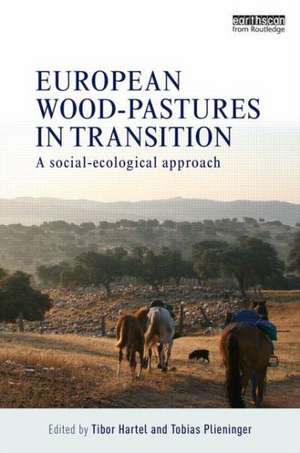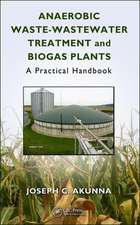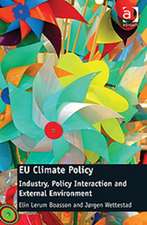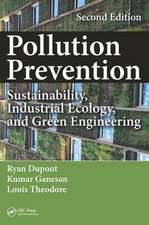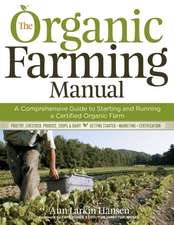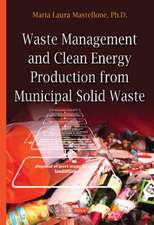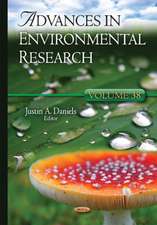European Wood-pastures in Transition: A Social-ecological Approach
Editat de Tibor Hartel, Tobias Plieningeren Limba Engleză Hardback – 25 iun 2014
This book examines the diverse expressions of wood-pastures across Europe. It provides a new perspective, using a social-ecological framework to explore social and ecological values, governing institutions, threats and conservation approaches. It explores the major drivers of decline, which are shown to be related to accelerated cultural, institutional and developmental changes occurring across Europe over the past century. Case studies are included from North-Western, Southern, and Eastern Europe.
Written by renowned scholars and conservationists, the book contributes to developing better, locally adapted conservation policies and management approaches for wood-pastures.
| Toate formatele și edițiile | Preț | Express |
|---|---|---|
| Paperback (1) | 328.42 lei 6-8 săpt. | |
| Taylor & Francis – 8 dec 2017 | 328.42 lei 6-8 săpt. | |
| Hardback (1) | 825.43 lei 6-8 săpt. | |
| Taylor & Francis – 25 iun 2014 | 825.43 lei 6-8 săpt. |
Preț: 825.43 lei
Preț vechi: 1106.00 lei
-25% Nou
Puncte Express: 1238
Preț estimativ în valută:
157.96€ • 163.98$ • 131.72£
157.96€ • 163.98$ • 131.72£
Carte tipărită la comandă
Livrare economică 22 martie-05 aprilie
Preluare comenzi: 021 569.72.76
Specificații
ISBN-13: 9780415869898
ISBN-10: 0415869897
Pagini: 322
Ilustrații: 69 black & white illustrations, 10 black & white tables, 40 black & white halftones, 19 black & white line drawings
Dimensiuni: 156 x 234 x 23 mm
Greutate: 0.76 kg
Ediția:New.
Editura: Taylor & Francis
Colecția Routledge
Locul publicării:Oxford, United Kingdom
ISBN-10: 0415869897
Pagini: 322
Ilustrații: 69 black & white illustrations, 10 black & white tables, 40 black & white halftones, 19 black & white line drawings
Dimensiuni: 156 x 234 x 23 mm
Greutate: 0.76 kg
Ediția:New.
Editura: Taylor & Francis
Colecția Routledge
Locul publicării:Oxford, United Kingdom
Public țintă
PostgraduateCuprins
Part 1: Introduction 1. The Social and Ecological Dimensions of Wood-pastures 2. Diversity, Threats and Conservation of European Wood-pastures 3. Wood-pastures as Examples of European High Nature Value Landscapes – Functions and Differentiations According to Farming Part 2: History and Change 4. The Origins and History of Medieval Wood-pastures 5. Recent Dynamics of Evergreen Oak Wood-pastures in South-Western Iberia 5.1 Wood-pasture Profile: Monroy, Spain 6. Ecological Patterns and Processes at Various Spatio-temporal Scales in Wood-pastures of the Swiss Jura Mountains and Adaptation to Climate Change 6.1. Wood-pasture Profile: Musella, Italy Part 3: Biodiversity and Ecology 7. Plant and Vegetation Diversity in European Wood-pastures 7.1 Wood-pasture Profile: Saaremaa, Estonia 8. Wood-pastures as Reservoirs for Invertebrates 8.1. Wood-pasture Profile: Hatfield Forest, England 9. Grazing as a Tool for Wood-pasture Restoration and Management 9.1 Wood-pasture Profile: East Vättern Scarp, Sweden Part 4: Socio-cultural Values 10. Social-cultural Values of Oak Wood-pastures and Transhumance in Greece 10.1 Wood-pasture Profile: Western Lesvos, Greece 11. The Role of Traditional Ecological Knowledge in Managing Wood-pastures 11.1 Wood-pasture Profile: Csokonyavisonta, Hungary 12. Mapping Ancient and other Trees of Special Interest: UK citizens’ Contribution to World Tree Heritage Part 5: Governance Institutions 13. Wood-pasture Management in Southern Transylvania (Romania): from Communal to Where? 13.1 Wood-pasture Profile: Breite, Romania 14. Common Management of Wood-pastures and Sustainable Regional Development in the Southern Black Forest (Germany) 14.1 Wood-pasture Profile: Southern Black Forest, Germany 15. Institutional Arrangements of Wood-pasture Management: Past and Present (UK) Part 6: Synthesis 16. Wood-pastures and the Greening of the Common Agricultural Policy 17. European Wood-pastures in Transition: Lessons for Science, Conservation and Policy Development in High Nature Value Landscapes
Notă biografică
Tibor Hartel is Associate Professor in the Environmental Science Department at Sapientia University of Transylvania, Romania, and is a member of the Board of Directors of the Society for Conservation Biology: Europe Section. His research focuses on rural landscapes from Eastern Europe. He studies wood-pastures in Romania and has been involved in a number of management and educational activities targeting wood-pastures and old trees.
Tobias Plieninger is Associate Professor at the Department of Geosciences and Natural Resource Management, University of Copenhagen, Denmark. He is interested in the study of the driving forces, processes and patterns of changes in human-shaped landscapes. His research integrates natural and social science approaches to landscape ecology and conservation.
Tobias Plieninger is Associate Professor at the Department of Geosciences and Natural Resource Management, University of Copenhagen, Denmark. He is interested in the study of the driving forces, processes and patterns of changes in human-shaped landscapes. His research integrates natural and social science approaches to landscape ecology and conservation.
Recenzii
"Wood-pastures in their remarkable variety have not had the attention they merit in Europe. The authors of this book bring their richness to life by combining historical as well as ecological and sociological approaches, with some authoritative case histories. It is an important step forward in the literature." – David Baldock, Executive Director, Institute for European Environmental Policy.
"Tibor Hartel and Tobias Plieninger have put together a wonderful volume on European Wood-Pastures in Transition: A Social-Ecological Approach. The book, at the front of social-ecological research, is a most timely and valuable contribution to a deeper understanding of stewardship of social-ecological systems and the services they generate." – Carl Folke, Professor and Director, Beijer Institute, Royal Swedish Academy of Sciences and Science Director, Stockholm Resilience Centre, Stockholm University.
"In a world where agriculture is becoming synonymous with laser-directed plow lines steering crop bed planting, this book opens our eyes to a different farming that is part of nature, with woodlands that provide sustenance for generations, often with breathtaking beauty and resilience. Expert and insightful analyses are offered of complex systems where trees and grass, culture and ecology, tradition and science give rise to sustainable agricultural systems." – Lynn Huntsinger, Professor, Department of Environmental Science, Policy and Management, University of California at Berkeley.
"This book is ultimately an outstanding and alluring call to action for efforts to balance the ecological, economic, institutional, cultural and social components of wood-pastures that are required to guarantee the long term preservation of these landscapes in Europe." – Agroforestry Systems, R. A. Correia, Universidade de Lisboa, Portugal
"Tibor Hartel and Tobias Plieninger have put together a wonderful volume on European Wood-Pastures in Transition: A Social-Ecological Approach. The book, at the front of social-ecological research, is a most timely and valuable contribution to a deeper understanding of stewardship of social-ecological systems and the services they generate." – Carl Folke, Professor and Director, Beijer Institute, Royal Swedish Academy of Sciences and Science Director, Stockholm Resilience Centre, Stockholm University.
"In a world where agriculture is becoming synonymous with laser-directed plow lines steering crop bed planting, this book opens our eyes to a different farming that is part of nature, with woodlands that provide sustenance for generations, often with breathtaking beauty and resilience. Expert and insightful analyses are offered of complex systems where trees and grass, culture and ecology, tradition and science give rise to sustainable agricultural systems." – Lynn Huntsinger, Professor, Department of Environmental Science, Policy and Management, University of California at Berkeley.
"This book is ultimately an outstanding and alluring call to action for efforts to balance the ecological, economic, institutional, cultural and social components of wood-pastures that are required to guarantee the long term preservation of these landscapes in Europe." – Agroforestry Systems, R. A. Correia, Universidade de Lisboa, Portugal
Descriere
The major aim of this book is to offer a pan-European synthesis of the diverse nature of wood pastures, their social and ecological values, governing institutions, threats and conservation approaches. An innovative and comprehensive social-ecological framework is used to provide a common structure and organise study cases from Eastern and Western Europe.
